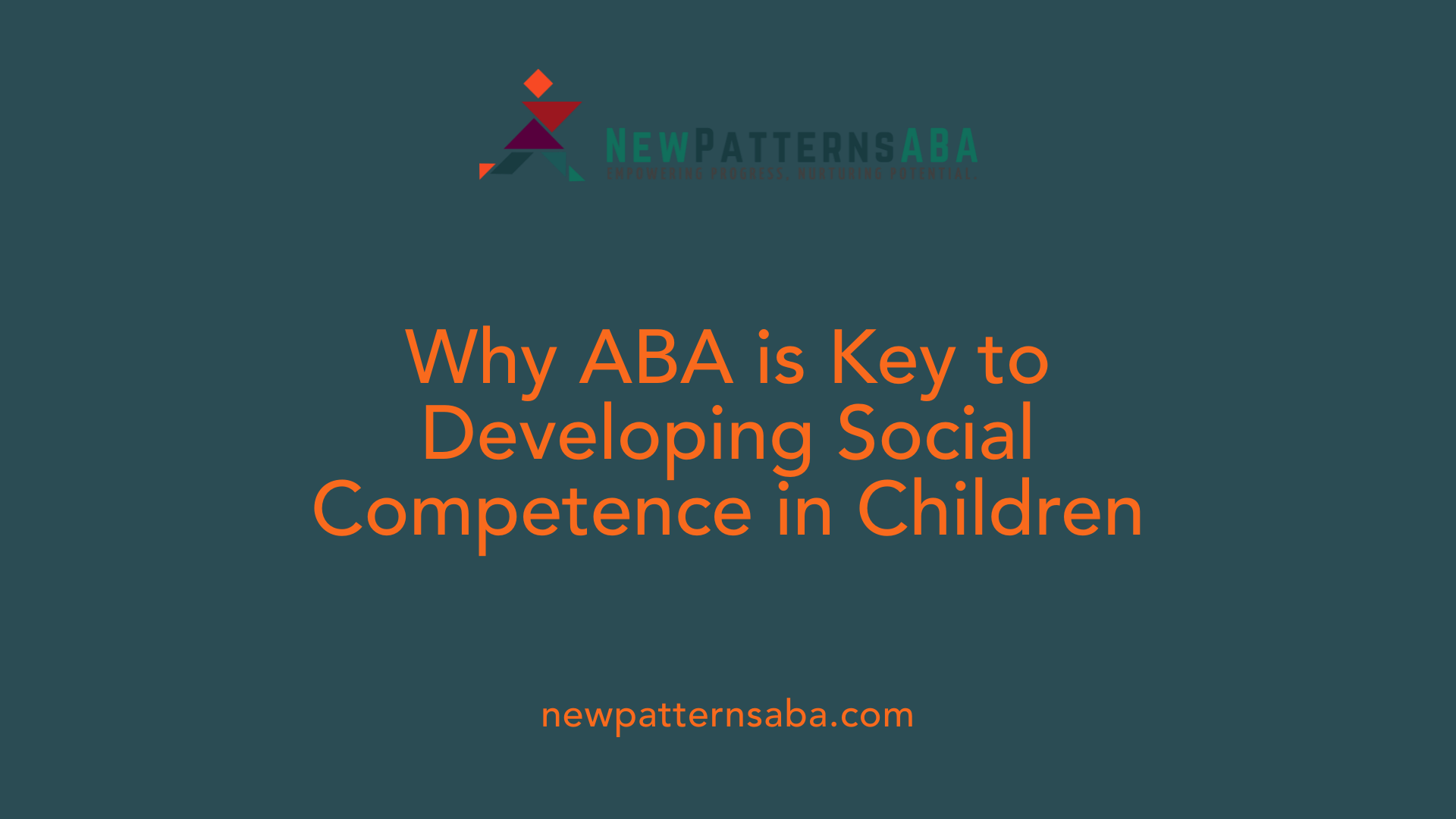Understanding ABA Therapy's Impact on Social Navigation
ABA therapy, or Applied Behavior Analysis, is an evidence-based approach widely recognized for its effectiveness in improving social skills among children with developmental challenges, including autism spectrum disorder (ASD), ADHD, and Asperger's. This article explores how ABA systematically supports children in understanding social rules, enhances their social interactions, and builds their independence by employing tailored techniques rooted in behaviorism.
The Foundations and Principles of ABA Therapy

What is the role of ABA therapy in helping children understand and apply social rules?
ABA therapy is essential in teaching children how to navigate social norms and build meaningful relationships. It breaks down complex social behaviors into smaller, manageable steps, making them easier to learn and practice.
Through structured techniques like modeling, role-playing, and social stories, children learn key social skills such as greeting others, sharing, and turn-taking. These activities help children understand social cues, personal space, and appropriate ways to communicate.
Assessment tools are used to evaluate each child's current social abilities. Based on these assessments, therapists develop personalized goals that target the child's specific needs.
Parents and caregivers are integral to this process. They work closely with therapists to practice social skills at home and in community settings, ensuring consistency and reinforcement.
Throughout therapy, positive reinforcement—such as praise, tokens, or preferred activities—encourages children to repeat desired behaviors. This approach not only boosts confidence but also fosters the development of social competence.
By systematically teaching social skills, ABA therapy helps children reduce social anxiety, improve peer interactions, and participate actively in social environments. Essentially, it promotes independence, enabling children to understand and apply social rules in everyday life.
Targeted Social Skills Development in Children with Autism, ADHD, and Asperger's
How does ABA therapy support social skill development in children with autism, ADHD, and Asperger's?
ABA therapy plays a crucial role in helping children with autism, ADHD, and Asperger's develop essential social skills. It does so by employing a systematic approach that teaches specific behaviors through structured routines, modeling, and positive reinforcement. This method involves breaking down complex social behaviors into smaller, manageable steps, making learning more accessible.
One effective technique used is behavioral skills training (BST). This process includes explaining the importance of a particular social skill, demonstrating it through role-playing or modeling, and then providing immediate feedback. This step-by-step guidance helps children grasp social norms such as taking turns, making eye contact, or initiating conversations.
Goals set in ABA therapy are highly individualized, aiming to be clear and measurable. As children demonstrate mastery of basic skills like greeting others or following instructions, their goals progress towards more sophisticated abilities, such as understanding social cues or maintaining conversations.
Therapists utilize various tools like visual aids, social stories, and role-playing activities to teach these skills. Such tools enhance understanding and help children generalize what they've learned across different settings, whether at home, school, or in the community.
Creating a supportive environment is fundamental. ABA emphasizes involving parents, teachers, and caregivers to ensure children can practice and reinforce their social skills consistently. This comprehensive approach fosters meaningful peer interactions, improves self-esteem, and encourages greater independence.
Overall, ABA therapy’s structured, individualized, and supportive framework equips children with autism, ADHD, and Asperger’s with the social competencies necessary for successful social engagement and personal growth.
Methods and Techniques in ABA for Teaching Social Rules

What methods and techniques are used in ABA therapy to teach social rules to children?
ABA therapy uses several structured methods to teach children social rules effectively. One of the core approaches is Behavioral Skills Training (BST), which combines explaining, demonstrating (modeling), practicing through role-playing, and giving feedback to reinforce correct behaviors.
Social narratives and stories are also popular tools. These involve creating personalized stories or comic strips that depict social situations, helping children understand appropriate responses and perspective-taking.
Structured group activities and role-playing are integral for practicing social interactions in a controlled, safe environment. These activities often include small group work, where children learn turn-taking, sharing, and social cues with guidance from therapists.
Visual supports, such as social stories, schedules, and cue cards, provide visual cues that facilitate understanding and applying social norms. These tools help children anticipate social situations and respond appropriately.
Breaking down complex social behaviors into manageable steps—known as task analysis—is essential. This technique ensures that children can learn behaviors like initiating conversations or understanding personal space gradually and successfully.
Additional strategies include peer-mediated interventions, where classmates are involved to promote natural social interactions, and the use of positive reinforcement, such as praise or tokens, to motivate and encourage social skill development.
Together, these methods make social learning accessible and adaptable, supporting children in integrating social rules into everyday life and building meaningful peer relationships.
Benefits and Demonstrated Effectiveness of ABA in Social Development

What are the benefits and effectiveness of ABA therapy in improving children's social interactions and daily functioning?
ABA therapy has shown significant success in enhancing social behavior, communication, and overall daily functioning in children with autism spectrum disorder (ASD). It systematically targets skill development through structured teaching methods like modeling, prompting, and reinforcement, which help children learn appropriate social interactions.
Research indicates that intensive, early intervention with ABA can lead to notable improvements, especially in children who initially struggle with non-verbal communication or social cues. Many children attain meaningful progress, such as enhanced language skills, better peer interactions, and increased independence in daily tasks.
Modern ABA approaches prioritize play-based and naturalistic techniques that cater to individual interests, making therapy more engaging and effective. These methods facilitate real-life social situations, helping children generalize their skills to everyday environments.
Meta-analyses reflect that ABA leads to small to moderate improvements in adaptive and intellectual skills, especially when carried out over multiple years. However, while observed outcomes are positive, ongoing research continues to refine and validate the long-term benefits.
Overall, ABA therapy empowers children to navigate social settings more confidently, promoting social integration and independence. It also provides families with practical strategies to support their child's development, fostering stronger family bonds and greater daily functioning.
| Aspect | Effect | Additional Details |
|---|---|---|
| Social Interaction | Improved peer engagement | Teaching turn-taking, sharing, and eye contact |
| Communication | Enhanced language and non-verbal skills | Use of picture cards, social stories |
| Daily Living Skills | Increased independence | Tasks like dressing, grooming, and requesting |
| Behavior Regulation | Reduced challenging behaviors | Desensitization, coping strategies |
| Overall Development | Gains in adaptive functioning | Supported by tailored assessments and progress tracking |
Implementing these effective strategies leads to more positive social outcomes, giving children with ASD a chance to thrive socially and academically, ultimately fostering a richer, more connected life.
The Significance of ABA in Promoting Social Competence

Why is ABA therapy considered important in aiding children's navigation of social rules and improving social competence?
ABA (Applied Behavior Analysis) therapy is highly valued for its effectiveness in helping children develop crucial social skills. It offers structured, personalized strategies that are specifically designed to meet each child's unique needs. Therapists utilize a variety of evidence-based techniques, including behavioral skills training (BST), role-playing, visual aids like picture cards, and consistent repetition to teach social behaviors.
Through these methods, children learn a wide range of skills such as asking for help, making eye contact, sharing, taking turns, understanding personal space, and interpreting social cues like body language and facial expressions.
Goals in ABA social programs are clear, measurable, and tailored to the child's developmental stage. Progress is closely monitored through ongoing data collection, allowing therapists to modify strategies as needed. This adaptability ensures that interventions remain effective and relevant.
Breaking complex social behaviors into smaller, manageable parts makes it easier for children to learn. Reinforcement, often in the form of praise, tokens, or enjoyable activities, encourages repeated behaviors, fostering confidence and independence.
Overall, ABA's systematic approach helps children enhance their social functioning and develop meaningful relationships. Its emphasis on skill acquisition, reinforcement, and continual assessment makes it a powerful tool in nurturing social competence in children with autism spectrum disorder and other developmental challenges.
The Role of Parental and Community Involvement in Reinforcing Social Skills
How do parents and caregivers support social skill development in ABA therapy?
Parents and caregivers are vital in reinforcing social skills learned during ABA therapy. Their active participation helps extend the benefits of therapy beyond clinical sessions, promoting consistency and application across different settings. Caregivers can practice newly learned behaviors with children in everyday situations, such as turn-taking during play or greeting others politely.
Providing consistent reinforcement, like praise or tokens, encourages children to repeat positive behaviors. Setting up social opportunities through playdates or community activities allows children to apply skills in real-world contexts. Collaboration with therapists is crucial; it helps caregivers understand which strategies work best.
Therapists often teach caregivers how to prompt social behaviors, reinforce successes, and use visual tools like social stories or visual schedules. Patience and modeling appropriate social interactions make children feel supported and motivated to improve.
Educating caregivers about the importance of patience and providing them with effective tools enhances the child's ability to generalize social skills across different environments. When families and therapists work together, children gain confidence, build social competence, and develop meaningful peer relationships.
Long-Term Outcomes and the Future of ABA in Social Skills Training
Monitoring progress through assessments
One essential aspect of ABA therapy's effectiveness in developing social skills is systematic monitoring through assessments. These assessments include pre- and post-intervention evaluations that track a child's progress over time.
By collecting data at various stages, therapists can determine whether specific skills, such as initiating conversations, understanding social cues, or taking turns, are improving. This ongoing process allows for tailored adjustments in strategies, ensuring that the intervention remains aligned with the child's evolving needs.
Benefits of consistent assessment include identifying areas that require more focus and recognizing successful skill generalization across different contexts, such as school, home, or community settings. These data-driven insights support the customization of programs, confirming that children are acquiring skills that promote social independence.
What are the long-term benefits of ABA therapy in promoting social competence?
Long-term outcomes of ABA therapy are encouraging. Children who receive consistent ABA intervention tend to show sustained improvements in communication, social interactions, and adaptive behaviors. These gains often translate into greater independence and active participation in community activities.
Through regular assessments, programs can be adapted to meet the growing and changing needs of the individual. Over time, children can navigate more complex social environments, build meaningful relationships, and succeed academically and socially.
While early intensive intervention yields significant benefits, ongoing support remains vital. Reinforcing skills and addressing new social challenges help ensure that progress is maintained and expanded. Advances in ABA are increasingly incorporating naturalistic, play-based, and technology-driven methods to make social skills training more engaging and effective.
Future directions in ABA social skills training
Looking ahead, the future of ABA in social skills development aims to enhance generalization and long-term success. Innovations such as interactive apps, virtual reality, and social storytelling are being integrated to create more natural and motivating learning environments.
Furthermore, a greater emphasis is placed on teaching social-emotional understanding, perspective-taking, and coping strategies to address broader social challenges.
Overall, the continuous evolution of ABA techniques promises to support children in achieving not only immediate social goals but also lifelong social competence and connectivity.
Empowering Children for Social Success
ABA therapy's structured, individualized approach provides children with the essential social skills they need to succeed and thrive. By systematically teaching and reinforcing social behaviors, involving families, and continually assessing progress, ABA helps children build confidence, foster meaningful relationships, and navigate social rules effectively. As research advances, ABA continues to evolve, promising even greater support for children's social development and overall quality of life.
References
- Is ABA Therapy Worth It? - Behavioral Intervention For Autism
- Benefits of ABA Therapy for Children with Autism
- Mastering Social Skills: ABA Therapy for Autism
- How ABA Therapy Supports Social Skills Development in Children ...
- 5 Ways ABA Therapy Supports Children With Autism - PediaPlex
- Effectively Teaching Social Skills in ABA
- Effectively Teaching Social Skills in ABA
- The effectiveness of applied behavior analysis program training on ...
- Applied Behavior Analysis (ABA) | Autism Speaks





